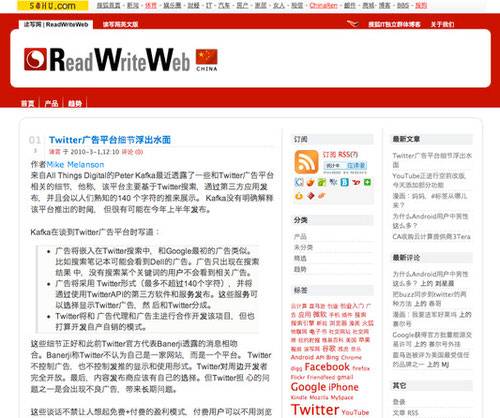In the West, the concept of the ‘read/write Web’ is a relatively easy one to get behind. Everybody can contribute content to the Web (‘write’), as well as read it – it’s a very democratic notion.

However in countries where democracy doesn’t prevail, the read/write Web is often subject to censorship rules. Indeed in December, ReadWriteWeb China was off the air due to the temporary closure of our syndication partners Yeeyan. In this post we look at how and why that happened.
The Global Times recently published a special report about censorship in China. It is an illuminating analysis of a number of publishers who have been censored or who self-censor themselves in order to survive.
On March 15, ReadWriteWeb founder Richard MacManus will participate in a special event at the Paley Center in New York City: a conversation with Chinese artist Ai Weiwei and Twitter co-founder Jack Dorsey about digital activism in China.
According to Wikipedia, Internet censorship in China is “conducted under a wide variety of laws and administrative regulations.” In particular China looks to censor political or social content. In mid-2009 a number of prominent Western social networking sites were blocked in China, including Facebook and Twitter. Western media speculated that the bans were put in place to prevent activists from using social networks to organize themselves – which happened in Iran in June of 2009, when Iranian election protesters used Twitter to call attention to their cause.
Self-censorship
Inside China, self-censorship is practiced by many web publishers in order to prevent trouble. “Self-censorship is the rule of survival that prevents popular websites from being shut down,” said veteran web developer Zoe Wang in The Global Times.
However, self-censorship is difficult to do in practice – because it’s not regulated by a single authority and so there are a lack of clear rules on what to censor. Web publishers in China are never sure what could get their site shut down.

On sites driven by user-generated content, publishers routinely censor political content. But while this may appease the government, it risks upsetting the core users. This has been the case on Douban, a popular social network in China with 33 million registered users. Censorship has recently tightened on Douban, leading to “veteran members” protesting about the censorship of certain photos, poetry and book reviews.
Site Closures, Including RWW China
The Golbal Times points to three recent examples of sites closed down by authorities: Fanfou, Yeeyan and Blogbus. The latter two were recovered in January.
These site closures directly affected our own company, as Yeeyan is our syndication partner for ReadWriteWeb China.
Yeeyan is a community translation website (our initial review 3 years ago), which publishes some well-known Western news sites such as The Guardian, Time Magazine, the New York Times and of course ReadWriteWeb. In early December, Yeeyan was forced to shut down its site – including ReadWriteWeb China.

At the time of the closure, the following message was posted to the Yeeyan homepage by the Yeeyan team:
“Due to our errors in handling some of the articles on the website, we went against the relevant regulations; therefore Yeeyan has to temporarily shut off its server, and adjust the relevant content.”
Ethan Zuckerman from the Berkman Center for Internet and Society at Harvard Law School concluded that “at least one of the authorities that control the Chinese internet – which include the State Administration of Radio, Film and Television and the Ministry of Industry and Information Technology – found the prospect of frequent, high-quality translation of US and European media [from Yeeyan] threatening.”
Yeeyan re-opened in January (using .org instead of .com) and we’re certainly very pleased to see that ReadWriteWeb China is back as a result.
Free the read/write Web!
There’s no shortage of rhetoric from the West about why China should cease censorship of the Web. Indeed Google made a brave move earlier this year by threatening to pull out of China if it continued to have to censor search results. While there has been no resolution in the Google-China case as yet, at least the issue is being highlighted and challenged by companies of Google’s stature in 2010.
I hope that ReadWriteWeb’s participation in the March 15 event at the Paley Center in New York City, where I will be discussing these and other issues alongside prominent Chinese activist Ai Weiwei and Twitter’s Jack Dorsey, does its bit to help encourage China to remove censorship on the Web.
Bookmark our special Weiwei webpage to track the latest buzz about the March 15 event and view a video about Ai Weiwei’s art and digital activism.










